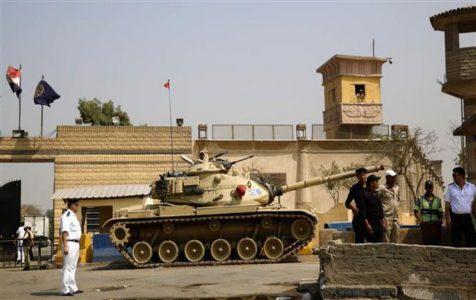
Prisons in Egypt are becoming recruiting grounds for the Islamic State terrorist group
The Islamic State suffered defeat in its final Syrian stronghold of Baghouz last month, the White House declared victory over the self-declared caliphate, announcing via Twitter that it has been “obliterated off the map.” But human rights organizations and activists are warning that far from the front lines, recruitment for the Islamic State and other extremist groups is increasing in Egypt’s prisons, where appalling prisoner conditions have accelerated recruitment.
Egyptian President Abdel Fattah al-Sisi has presided over what has been described by Human Rights Watch as “Egypt’s worst human rights crisis in decades.” Human Rights Watch estimated in 2016 that more than 60,000 people had been arrested or charged in Egypt since Sisi’s predecessor was ousted in a 2013 coup, with the arrests targeting a broad group of political opponents. Hussein Baoumi, an Egypt researcher for Amnesty International, said, “In Egypt, it is one of the worst periods in terms of crackdowns and arbitrary arrests. People can be arrested in Egypt for absolutely no reason at all.”
Egypt already has a history of militancy and extremism flourishing behind bars—al Qaeda’s current leader, Ayman al-Zawahiri, is among the high-profile jihadis radicalized in the country’s prisons. But Amnesty has branded Sisi’s crackdown on civil liberties “unparalleled in Egypt’s recent history,” with people being detained for “satire, tweeting, supporting football clubs, denouncing sexual harassment, editing movies.” In 2015, the government acknowledged that prisons were 160 percent over capacity, and the U.S. State Department since then has referenced life-threatening overcrowding. Estimates of the prison population vary, but in 2016, World Prison Brief estimated that around 90,000 prisoners, whether political or not, were held in the country’s prisons, with another 16,000 people held in its jails. Meanwhile, it is estimated that 18 new prisons have been built in the last six years, according to Human Rights Watch.
Rights organizations and former detainees fear that more people than ever are vulnerable to radicalization in prisons and jails.
Ayman Abdelmeguid, an engineer, says he was arrested for political activism in 2015 and was detained in al-Qanatar prison, the jail of Giza’s court, and several police stations. He saw several men detained for nonviolent crimes who then turned to extremism during detention.
“I have seen men who have been imprisoned because of a disagreement with a local police officer who then made a case against them. They end up going to prison, they are in a cycle of not being tried and then being put under arbitrary detention for an indefinite amount of time,” he said in March.
“These people are filled with so much hate—they hate the state and they hate the police. They have lost their jobs, they have lost their businesses. This makes their lives miserable, they leave a family behind them. These are the people who are approached by extremists.”
Rather than condemning prison overcrowding and civil rights violations, in July 2018, the U.S. administration under President Donald Trump reinstated $195 million in military assistance to the Egyptian government. Trump froze the funds in 2017 in protest of Sisi’s passage of a law cracking down on nongovernmental organizations and the government’s cozy relationship with North Korea, but Washington restored military aid despite the absence of any meaningful human rights reform. The decision to concede funding in spite of human rights concerns followed a precedent set by the Obama administration, which froze military financing to Egypt in 2013 over human rights concerns only to relent two years later, citing a need to combat Islamic State militants.
Speaking in Cairo this January, U.S. Secretary of State Mike Pompeo praised the Egyptian president for “his vigorous efforts to combat the ongoing threat of terrorism as well as the radical Islamism that fuels it.” In spite of the Trump administration’s praise, both Republican and Democratic senators have recognized the threat that Sisi’s policies actually pose to national and international security.
In 2017, a bipartisan group of senators led by Republican Sen. Marco Rubio and Democratic Sen. Ben Cardin wrote to Trump, urging him to press the Egyptian government on human rights issues or “risk enabling Egypt to perpetuate the very sorts of conditions that help to breed violent extremism and terrorism.”
The State Department’s latest human rights report cited numerous human rights issues in Egypt including unlawful or arbitrary killings by the government, forced disappearances, life-threatening prison conditions, arbitrary arrest and detention, political imprisonment, and torture. These conditions have been acknowledged by numerous human rights organizations and, according to former detainees, are pushing prisoners toward the Islamic State.
According to Brian Dooley, a senior advisor at Human Rights First, “Sisi’s brutal crackdown on dissent is fueling ISIS’s growth, as the group recruits supporters in Egypt’s prisons at an accelerating rate. I have spoken to people who have seen ISIS recruiting in prisons as recently as this last year. ISIS now has de facto control of parts of the prison system.”
Source: Foreign Policy





